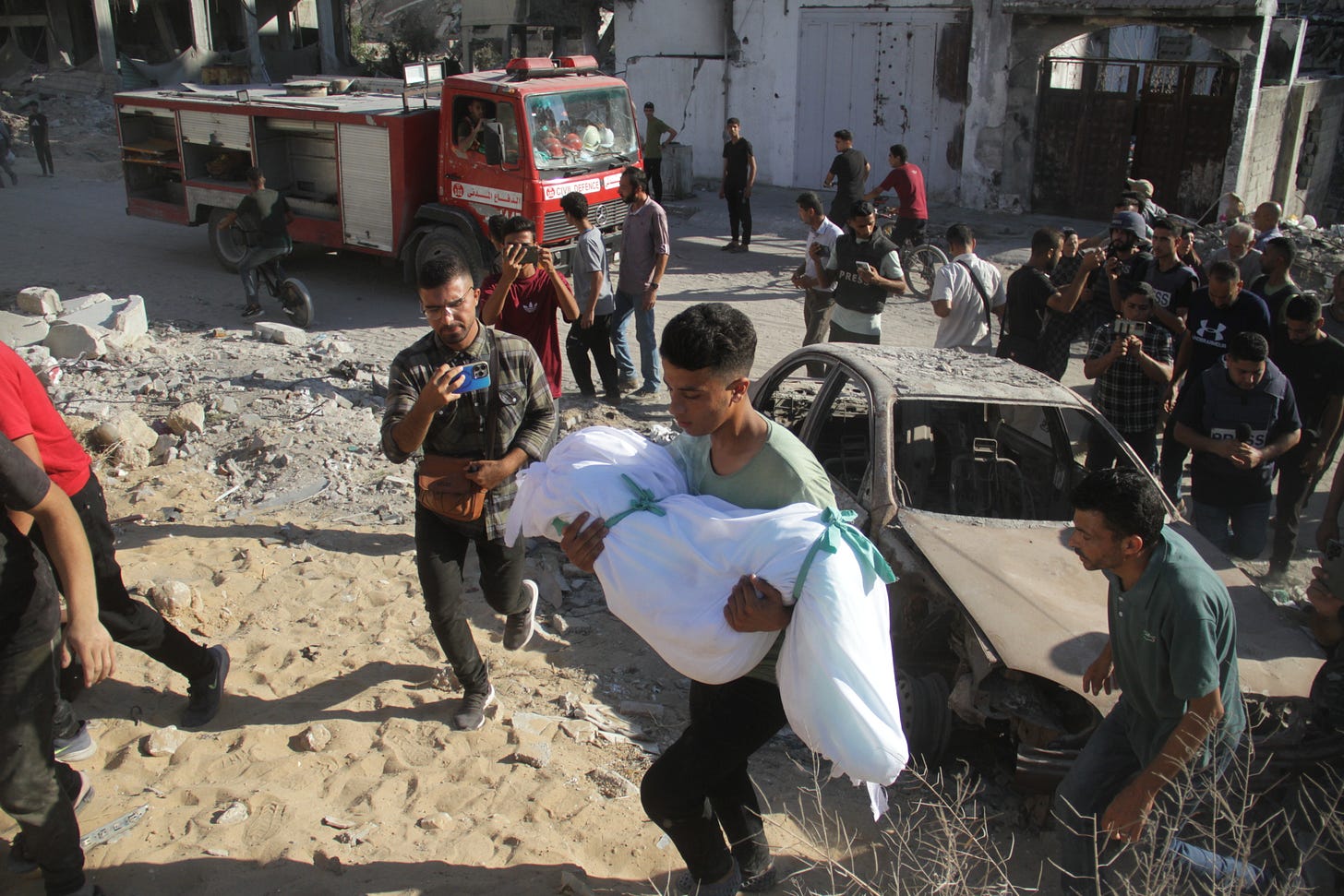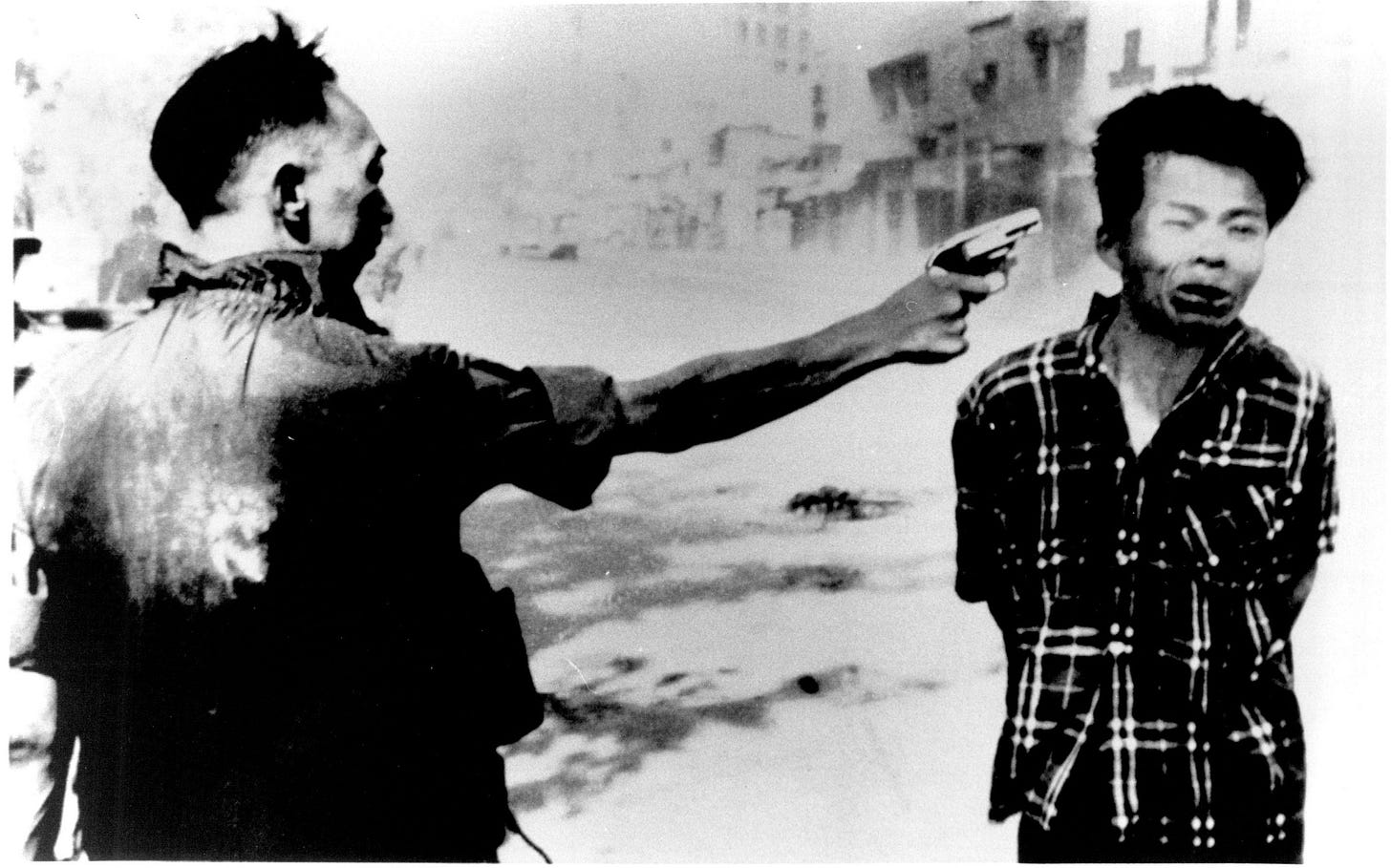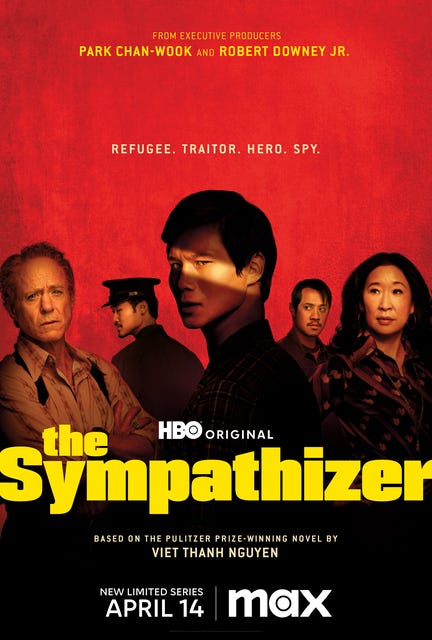Viet Nam, Gaza, and the Power of Spectacle
Pulitzer Prize Winner Viet Thanh Nguyen on how Hollywood has become the US military-industrial complex’s unofficial ministry of propaganda.

This is a tale of two spectacles.
The first one has unfolded with horrific images of the dead, wounded, and dismembered from Gaza, recorded mostly by Palestinian journalists and civilians. Those images have shared space on my news and social media feeds with the second spectacle, an American one ranging from partisan politics to celebrity gossip to the latest television or movie blockbuster. Alternating between these two dramas, the international and the domestic, on a daily, even hourly, basis has been unnerving. That distress, which I share with many, lends urgent meaning to the phrase, “You can’t look away.”
One function of a spectacle is to be so compelling that viewers are distracted from other events happening at their peripheral vision. The spectacle works by keeping our eyes fixed on it, from the historical power struggle depicted in the Emmy-winning FX series, ‘Shogun,’ to the actual political drama of the US presidential race. The unease we may feel watching a television series, hooked as we are on questions of who will die and who will triumph, is contained by our awareness that it is fiction. The discomfort of watching the American electoral melodrama has added bite, knowing that who Americans elect will have real-world consequences. Politicians, parties, states, PACs, and movements, all knowingly manipulate the narratives of their own spectacles. Entertainment and deadly stakes merge.
Watching Israel’s war on Gaza, or Hamas’ attack on Israel on Oct. 7, or the preceding televised Israeli invasions of Gaza, is to realize that as awful as war and massacre are, they also add up to a spectacle. The effects on viewers can be ambiguous. An unfortunate status that Viet Nam shares with Palestine is that the war in Viet Nam was both an actual war and a spectacle for global viewership. “Palestine is this generation’s Vietnam War,” activist Hatem Abudayyeh said as he prepared to bring antiwar protest to the Democratic convention in Chicago. While the wars in Viet Nam and Palestine are not the same, there are parallels – from massive protests to the way the visual images of the wars are received.
Although I was thrilled to see my novel adapted … the news from Gaza blunted my happiness.
As one of the characters from my novel The Sympathizer, which is about the consequences of the war in Viet Nam, said, “The world watched what happened to our country and most of the world did nothing. Not only that – they also took great pleasure in it.” The complications of watching and making spectacles, as well as being a part of them, were driven home even further for me recently because The Sympathizer itself became an HBO television series that debuted in April, even as the death toll in Gaza reached at least 34,622. Although I was thrilled to see my novel adapted, especially by the director Park Chan-wook, the news from Gaza blunted my happiness. Seeing the spectacles unfold side by side – my personal one, about the horrors of a past war, and the political one, about the horrors of a present war –reminded me of a question I sometimes think about: how did the rest of the world outside of Viet Nam, Laos, and Cambodia experience the war being fought, and as it became the first televised, living room war?
That media-saturated war left the world with indelible moving and still images, from the monk Thich Quang Duc immolating himself to the girl Phan Thi Kim Phuc running naked after being burnt by napalm to the piles of dead in a trench who were among the 504 civilians massacred by American soldiers at My Lai.

But while those images catapulted Viet Nam from a country into a war, another spectacle took place simultaneously, as the photographer Tod Papageorge shows in American Sports, 1970: Or How We Spent the War in Vietnam. In contrast to the stereotypical memories of that era – hippies, counterculture, antiwar protests – Papageorge’s photos document American crowds watching football and baseball games, having fun. The implication is clear: many, perhaps most, Americans went about their lives not thinking about the war, a task aided by the spectacle of sports.
What, then, to make of a television show such as ‘The Sympathizer,’ in an age of renewed war where the United States again plays a key participant?
Turning the Machinery Against Itself
The show presented a spectacle, with famous actors (Robert Downey, Jr., Sandra Oh), a talented Vietnamese cast (Hoa Xuande, Fred Nguyen Khan, Duy Nguyễn, Toan Le, Kieu Chinh, Nguyễn Cao Kỳ Duyên), and an enormous budget (although not as much as a single F-35, the premiere fighter jet of the United States military). But even if a spectacle entertains, its power to shape a common sense of public opinion should not be underestimated. The spectacle-as-entertainment has long been deployed to justify Israel’s war on Gaza and occupation of Palestine.
As a teenager in the 1980s, I watched the 1960 epic ‘Exodus,’ about the founding of Israel, on videotape. Paul Newman plays a handsome, resolute Jewish officer of the Zionist militia known as the Haganah, determined to rescue a shipload of Jewish refugees from the uncaring, antisemitic British army and deliver them to Palestine. There, they are threatened by Arab “terrorists,” who the Haganah and Irgun – another Zionist militant group – defeat. This was the extent of my education about Israel and Palestine – outside of Western news media – until university. I was not alone. In Orientalism, Edward Said bemoaned how most representations of Muslims and Arabs in late 20th-century Western pop culture depicted them as terrorists, normalizing Islamophobia.
If spectacles can entertain, distract, and pacify, they also have the power to stoke rage and resistance. But the narrative matters.
Spectacles are more easily consumable when they reinforce a society’s dominant thinking, or at least do not threaten it. ‘Exodus’ became popular in the postwar era, when American attitudes towards Jews and Israel were transformed by American guilt over the Holocaust and increasing American geopolitical interest in the Middle East (or West Asia). By the time I watched ‘Exodus,’ mainstream American thinking had become pro-Israel. The template ‘Exodus’ deployed – the pious defense of the underdog against an oppressor in the founding of a new land – resonated with American mythologizations about the United States’ origins and the US role in other lands, like Viet Nam. John Wayne’s 1968 epic of Vietnam War propaganda, ‘The Green Berets,’ likewise positioned the Viet Cong and Vietnamese communists as “terrorists,” with American soldiers helping the South Vietnamese defend their young nation.
I was thinking of ‘The Green Berets,’ and numerous other Hollywood-made movies of the war when I wrote The Sympathizer. My novel argues that Hollywood is the American military-industrial complex’s unofficial ministry of propaganda. While Hollywood’s spectacular movies depicted the conflict in Viet Nam as a dirty war, the propaganda achieved something more insidious: it continued to centralize Americans in the drama by depicting them as antiheroes and morally ambiguous villains, leaving the Vietnamese mostly as silent extras in the drama of their own war. As a television show, ‘The Sympathizer’ attempts to turn the machinery of the spectacle against itself, first by placing Vietnamese faces, names, viewpoints, and language at the center, and second by foregrounding American imperialism as a major cause of the war, contradicting how many Americans saw the war: a failed effort with noble ambitions.
Given the novel’s critique of American imperialism, the adaptation’s existence remains miraculous. The spectacle of our television show – while entertaining – contests the imperial and colonial mindset, that justified the spectacle happening simultaneously in Gaza. Nearly 50 years after the end of the American war in Viet Nam, Americans still have difficulty understanding the war’s significance, so unsettling is it to American self-conceptions. People mostly want their spectacles to be simple entertainment. They don’t want to look away, but will look away from spectacles that truly provoke.
Unsettling Spectacles
The war in Gaza is one of these unsettling spectacles whose final results remain unknown, but one thing is clear: Israel’s intention is to cow its enemies, not only with actual bombs but with the spectacle of razing Gaza. Gaza has become the most difficult kind of theater (of war and otherwise): where the spectator cannot look, and yet must look.
There are videos of universities, schools, hospitals, homes, and refugee camps being blown up. Of people beheaded. Of dead children. Of mass graves. Of columns of men stripped nearly naked. Of Israeli soldiers destroying and looting for fun. Of Israeli citizens holding up food and medical aid, storming their own military base, attacking Palestinians in the West Bank. Of rape. There is so much visual evidence of atrocity, recorded by Israelis themselves but mostly by Palestinians, that Israel has begun to lose control of the spectacle that has been crucial to its own self-justification as a nation.

The war in Viet Nam offers a parallel. The US lost that war for numerous military and political reasons, but the fact that the war became spectacular and that the US could not control the narrative of that spectacle, were crucial cultural factors in the American defeat. The real-world spectacles grew inseparable from the cultural spectacles. The Tet Offensive of 1968, which included the Viet Cong and the Northern Vietnamese army committing massacres against civilians in Hue, was a military defeat for the Viet Cong. But the offensive, with its spectacular images of Vietnamese guerillas invading the American embassy and Colonel Nguyen Ngoc Loan executing Nguyen Van Lem on a Saigon street in an infamous image captured by Eddie Adams, resulted in an important political victory, revealing the vulnerability of the American military and turning the tide of global public opinion against the American war.

Disrupting the Dominant Narrative
If spectacles can entertain, distract, and pacify, they also have the power to stoke rage and resistance. But the narrative matters. As Rashid Khalidi has argued in The Hundred Years’ War on Palestine, Israel has exercised great control of its narrative and its spectacle since 1948, so much so that reflexively supporting Israel and rendering Palestine invisible is common sense in the West.
Palestinian resistance has, therefore, been not only military and political but cultural, with a critical role for writers, artists, and filmmakers in contesting Israeli narratives and foregrounding Palestinian ones. The symbolic battle is arguably as important as the actual combat or, in this case, genocide. This is not to demean human suffering and the loss of lives, but to point to how the symbolic victories justify and perpetuate the military and political victories. Hence, the incredible amount of denial, lying, gaslighting, and hypocrisy on the part of Israel and its supporters, in the face of the overwhelming and spectacular deaths of Palestinians, as well as the systemic efforts of Israel and its supporters to demonize the Boycott, Divestment, and Sanctions movement and the student encampments this past spring, which were themselves a spectacle.

The global antiwar movement against the atrocities of the United States in Viet Nam could not prevent three million Vietnamese deaths, or more than 58,000 American ones, not to mention the hundreds of thousands dead in Laos and Cambodia. But perhaps there would have been even more deaths without that movement and its spectacular images. And in the aftermath of the war, with Democrat Jimmy Carter insisting the “destruction was mutual” (it wasn’t), the urgency of centering Vietnamese, Laotian, and Cambodian perspectives matters, including in the complicated realm of spectacle. Disrupting the dominant spectacle by creating another one ruptures the “common sense” that justifies genocide.
The current refusal of Palestinian Americans and their supporters in the United States to allow Kamala Harris and the Democratic Party to ignore Gaza, Palestine, the question of genocide, and American complicity should be understood in this framework of narrative struggle. The American presidential election is a gigantic spectacle of global impact, with everyone’s eyes fixed on it. For many who support Democrats, it defies common sense to make the genocide that Israel is committing a fundamental cause in the face of so many other pressing issues. But Palestinians and their allies have a chance to continue redefining that common sense, by leveraging the power of the spectacle that has historically been used to destroy and erase them.
Subscribe to Zeteo to get more from Viet Thanh Nguyen in your inbox.




This article really hit me. I've been saying that the Palestinian struggle is this generations Vietnam for months, except the Palestinian struggle existed during the Vietnam War and has endured for 76 years. I made a decision to educate myself and have been studying the history of Asia and what is considered the middle east (and North Africa). In March I visited Egypt and Morocco, next year I'm going to Thailand and Vietnam. My worldview has completely changed. I no longer rely on the western, i.e. American POV. My government probably now considers me radicalized.
Super well argued. It's become increasingly difficult to engage with American Media over the years and it's embarrassing to admit at the same time how inescapable it is.